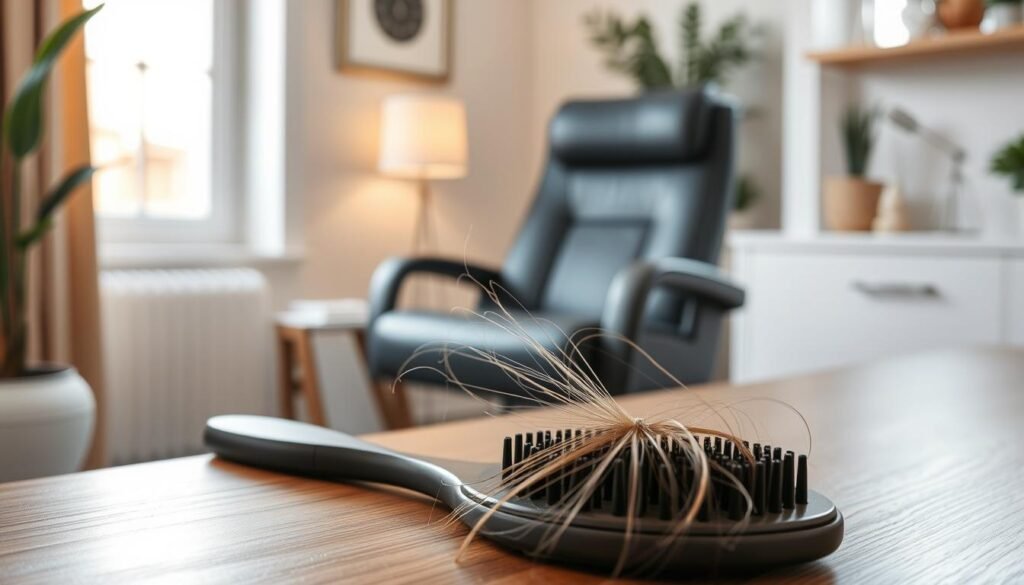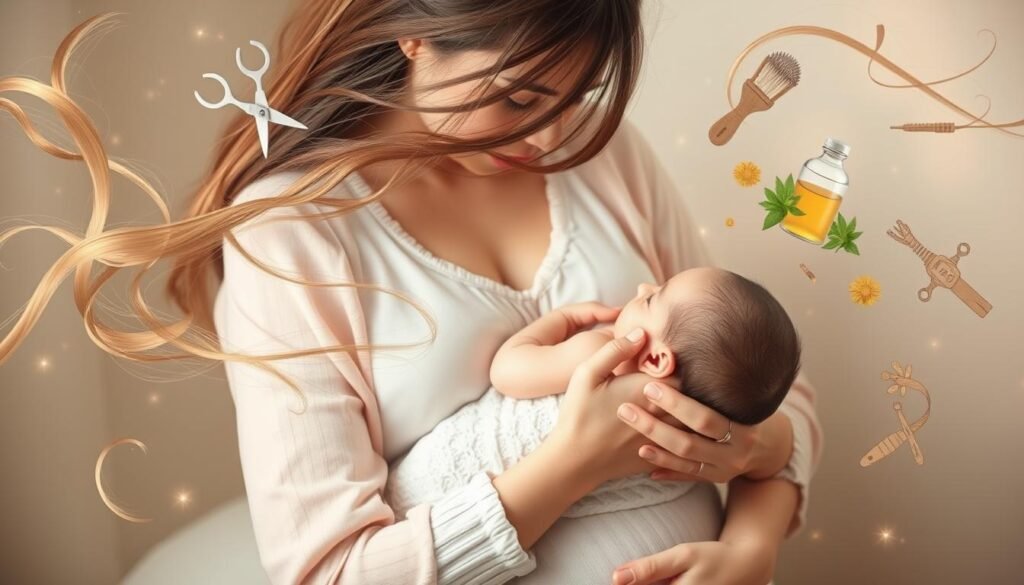About 40% to 50% of people notice hair loss after having a baby. This is often unexpected during the busy time of motherhood. Taking care of a newborn often means hair loss prevention gets ignored. This leaves many feeling upset about their looks. But, knowing how to lessen hair shedding gives people a way to improve their hair health.
This article talks about why hair loss happens after having a baby. It covers good nutrition, careful hair care, and how to prevent hair loss. By eating right, using smart hair care tips, and understanding hormones, you can reduce hair loss after having a baby. Remember, even if losing hair seems scary, there are good ways to deal with it and help your hair get healthy again. For more info on treatments and lifestyle tips, check out this detailed guide on preventing hair loss.
Key Takeaways
- Postpartum hair loss is common, affecting 40% to 50% of new mothers.
- Dietary choices play a crucial role in maintaining hair health postpartum.
- Effective hair care practices can minimize shedding and enhance appearance.
- Recognizing hormonal changes is key to understanding hair loss patterns.
- Many individuals can expect their hair to begin regrowth within three to six months after childbirth.
- Proactive prevention strategies can significantly improve hair recovery.
Understanding Postpartum Hair Loss
Postpartum hair loss usually starts about three months after giving birth. It can last up to six months. During pregnancy, higher hormonal levels stop normal hair shedding. This makes hair look fuller. After the baby is born, pregnancy hormones go back to how they were before. This leads to a lot of hair shedding after pregnancy. About 100 hairs can be lost every day as your body deals with these changes.
It’s important to know this condition is normal. Many people get really thick hair while pregnant. But after the baby comes, they lose a lot of hair. The worst shedding usually happens about four months after having the baby. Though losing hair can be upsetting, most people’s hair looks normal again within a year.
Keeping your hair healthy during this time is key. Eating well and taking prenatal vitamins can help your hair grow back. Try to wash your hair less often. Use a good conditioner and avoid tight hairstyles. Also, avoid using heat on your hair as much as possible. Knowing about these body changes helps in dealing with hair loss better.
The Timeline of Hair Shedding After Pregnancy
New moms need to learn about when they might lose hair after having a baby. Usually, hair loss starts to be noticeable at three months postpartum. Women might find they’re losing 100 to 200 hairs every day at this time. This hair loss period often reaches its worst between four to six months after the baby arrives.
As time goes on, hair shedding might continue for six to twelve months. By then, many will see their hair health getting better. The baby’s first birthday might also mean a return to normal hair loss levels for a lot of people. Signs that hair is coming back usually show between nine to twelve months postpartum.
A few things determine how long postpartum hair loss lasts. Genetics, your health after delivery, and stress can all affect hair shedding. You might notice less hair falling out, your scalp appearing less, and the appearance of small, soft hairs signaling hair loss might be slowing down. Other signs include hair feeling thicker and your ponytail getting wider.
It’s important for new moms to know about this timeline of hair shedding. If hair loss goes on longer than usual, help is out there. Getting help from professionals can offer more understanding and ways to keep hair healthy during this time.
For more about dealing with postpartum hair loss, check out this resource.
Common Causes of Postpartum Hair Loss
New moms often face postpartum hair loss. It’s a tough phase. Major triggers include hormonal changes, emotional stress, and nutritional deficiencies.
Pregnancy keeps hair in the growth phase longer. After birth, hormone levels drop. This change causes hair to shed more, sometimes reaching up to 300 hairs a day.
The stress of having a baby also plays a role. It adds to the hair loss problem.
Not getting enough vitamins and minerals makes it worse. These nutrients are key for hair to grow back strong.
Many moms go through this. Understanding the reasons behind postpartum hair loss helps. Learning about this can lead to steps that support hair growth during this time.
Prevention: Effective Strategies to Minimize Hair Loss
Some key strategies can help manage hair loss after having a baby, mainly through nutrition. A good diet plays a vital role in keeping your hair healthy. Choosing the right foods can lay a strong base for hair to bounce back after pregnancy.
Nutrition and Its Impact on Hair Health
The effect of nutrition on hair health is huge. Hair growth and strength depend on proteins, vitamins, and minerals. Foods loaded with biotin, zinc, and omega-3 fats can make hair tougher. Prenatal vitamins help women during and after pregnancy by providing vital nutrients. Adding supplements for postpartum recovery can fill any nutritional shortages, helping feed hair roots properly.
Maintaining a Balanced Diet
Eating a balanced diet is key to avoid losing hair. Include whole grains, green veggies, fruits, and healthy fats for a vitamin boost. Planning meals with these foods can improve your hair health. Eating nutrient-rich foods regularly helps your body handle the changes after giving birth. For tips on fighting hair loss, check out this resource.

Proactive Measures for Hair Care
Taking steps early in hair care can really help people with postpartum hair loss. Using gentle hair routines and choosing the right hair care items can lower hair damage. This supports healthy hair growth during this time of change.
Gentle Hair Care Practices
Gentle hair care is key for healthy hair. Washing your hair only three times a week keeps it moist. This avoids losing important oils. Using a gentle shampoo and a good conditioner helps keep the hair hydrated.
Doing deep conditioning treatments three times a week strengthens hair. This makes hair strands strong and healthy.
- Use a wide-toothed comb for detangling, reducing the risk of breakage.
- Limit heat styling to twice a month to avoid damage from heat exposure.
- Schedule trims every eight to twelve weeks to eliminate split ends.
- Consider regular scalp massages to enhance circulation.
Choosing the Right Hair Accessories
Choosing the right hair products and accessories can prevent hair damage. Picking things like soft scrunchies instead of tight elastics helps avoid too much pulling. This pulling can lead to hair loss. Using soft brushes made from natural fibers also helps reduce hair breakage.
| Hair Care Practice | Frequency Recommendation | Benefits |
|---|---|---|
| Shampooing | 3 times a week | Maintains moisture balance |
| Deep Conditioning | 3 times a week | Nourishes hair |
| Heat Styling | Twice a month | Prevents damage |
| Trimming | Every 8-12 weeks | Reduces split ends |
By sticking with these gentle practices and choosing smart hair accessories, people can greatly improve their hair’s health and strength. Restoring hair quality might take some time. Yet, being careful with how you treat your hair can bring positive changes.
The Role of Hormones in Postpartum Hair Loss
Hormones play a big part in postpartum hair loss. After giving birth, a woman’s estrogen levels fall quickly. This drop makes hair shift from growing to shedding. This sheds hair about three months after the baby arrives. It’s called telogen effluvium.
Knowing about hormones helps us understand why hair falls out after childbirth. As estrogen goes down, other hormones and thyroid issues might cause more loss. If a woman already had certain conditions, the hair loss could be worse.
Around 40% to 50% of moms in America go through this. Most will get their thick hair back within six months. Things like how long they breastfeed and their thyroid health affect this time. Learning about hormones and hair can help women find ways to feel better about hair loss.
For tips on handling postpartum hair loss, check out research. Look into how hormones affect hair.
Protective Actions to Safeguard Your Hair
Postpartum hair needs extra care. It’s a phase where the hair is sensitive. It’s important to avoid heat and chemical damage. This helps the hair recover and stay strong.
Avoiding Heat and Chemical Damage
Avoiding heat is key for healthy hair. Heat tools like dryers and irons can cause breakage. Try to use them only once a week. Use protection like sprays or serums to lessen damage when styling with heat.
It’s also good to avoid chemicals. Things like dyes and perms dry out hair. Without them, hair can get stronger. Maintain its health with regular and deep conditioning each week for moisture.
Here are some tips for hair care:
- Shampoo a few times weekly to keep the natural oils balanced.
- Apply conditioner to the mid-lengths and ends for moisture.
- Use deep masks weekly for extra moisture and strength.
- Detangle gently before shampooing to avoid breakage.
- Use treatments to keep the scalp hydrated and avoid dryness.
- Choose wide-toothed combs for gentle detangling and less damage.
| Hair Type | Recommended Trimming Frequency | Conditioner Application |
|---|---|---|
| Short/Bobbed | Every 3-7 weeks | Mid-lengths and ends |
| Textured/Curl | Every 8-12 weeks | Mid-lengths and ends |
| Long | At least every 12 weeks | Mid-lengths and ends |
Taking care of your hair postpartum is very important. A well-rounded hair care plan can make it stronger. This way, hair is less likely to get damaged from heat or chemicals.
Recognizing When to Seek Professional Help
Postpartum hair loss can be natural, but sometimes, it points to a bigger problem. Excessive hair loss, especially if it continues for months or comes with other symptoms, needs attention. New moms should know when to worry about their hair health.
Seeing a doctor can offer clear advice. Issues like postpartum thyroiditis can greatly impact hair health. About 70% of women feel stressed about their hair loss. This shows how important postpartum consultations are for both physical and mental health.
If you’re feeling anxious about your hair, knowing when to get help is key. Look out for signs like:
- Heavy shedding that affects everyday life.
- Noticeable changes in hair texture or thickness.
- A family history of hair loss that worries you.
- Other symptoms, such as tiredness or mood changes.
Seeking professional help early on can help manage the situation better. It prevents worse problems later. Moms should take care of their health and find the right support.

Risk Reduction Through Lifestyle Changes
Positive lifestyle changes are key in reducing the risk of postpartum hair loss. They improve not just overall health but also hair health after childbirth.
It’s vital to manage stress to prevent hair loss. Activities like yoga, mindfulness, or exercise can help keep calm. This helps the body recover and supports hair growth.
Getting enough sleep is crucial, too. Aim for 7 to 9 hours of good sleep each night. This helps your body heal and is good for your hair.
Staying hydrated is also important for postpartum care. Drinking lots of water nourishes the hair roots, leading to stronger hair. Following a consistent routine that includes self-care and healthy habits can help lessen hair loss during this time.
Eating a balanced diet rich in vitamins and minerals is vital for hair health. The right nutrients can greatly reduce the risk of hair loss after pregnancy.
| Lifestyle Change | Benefit |
|---|---|
| Regular Exercise | Improves mood and reduces stress levels |
| Adequate Sleep | Enhances recovery and overall health |
| Hydration | Supports hair and scalp health |
| Healthy Diet | Provides necessary nutrients for hair growth |
By adopting these lifestyle changes, you’re taking a proactive step towards better postpartum care. Keeping stress in check and maintaining healthy habits can significantly improve overall health and hair vitality during this crucial period.
Myths and Facts About Postpartum Hair Loss
New moms often worry about hair loss. This concern comes from common myths. Learning the facts can help ease their minds. Many think hair loss after having a baby means they’ll be bald forever. But this is not true. Most of the time, hair loss after pregnancy is short-lived.
It usually gets better in three to six months. Some people believe special products can stop hair from falling out. While certain items might improve hair’s look, no treatment can entirely prevent losing hair after childbirth. Educating mothers about hair growth phases can set realistic expectations.
About 70% of hair moves from growing to resting phase after having a baby. This leads to more hair falling out. But it’s a normal reaction to hormonal changes, not a sign of lasting harm.
To understand postpartum hair loss better, this table shows myths versus facts:
| Myth | Fact |
|---|---|
| Hair loss after pregnancy is permanent. | Postpartum hair loss is usually temporary and resolves within a year. |
| Using special shampoos can stop hair loss. | No product can entirely prevent postpartum shedding; some may assist in appearance. |
| Women will go bald after childbirth. | Most women experience some shedding, but it does not result in baldness. |
| Postpartum hair loss occurs only in women over 30. | It can affect women of all ages after childbirth. |
Teaching new moms about hair loss dispels myths. It helps them tackle postpartum challenges with confidence. Knowing the truth supports new moms during this change in their lives.

Conclusion
Dealing with postpartum hair loss is tough, but knowing about it helps a lot. It’s crucial to use good prevention methods to lessen its effects. Good nutrition, proper hair care, and stress management are key for keeping hair healthy.
We’ve shared tips to help you fight postpartum hair loss. By clearing up myths, you can face this period with more confidence and hope. Good hair care supports both your look and your mood during the postpartum time.
Learning from this article can help you handle postpartum hair loss better. Taking care of yourself and understanding what you’re going through can lead to healthier hair and a happier postpartum period.